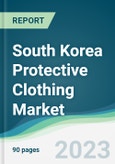The South Korean protective clothing market is projected to grow at a CAGR of 4.55% over the forecast period, increasing from US$201.442 million in 2021 to reach a total market size of US$275.076 million by 2028.
The increasing concern about workplace safety, mainly in the chemical, food processing, healthcare, and manufacturing sectors among others are contributing to an increase in South Korean protective clothing market growth in the projected period. The South Korean government has made it mandatory for the manufacturers of imports of household goods must comply with the specifications of wearing protective clothing while dealing with household goods.Increasing demand in various end-user industries
The demand for protective clothing is increasing in the country due to rising demand in end-user industries such as oil and gas, manufacturing, and chemical industry among others. The rising demand for oil and gas is making South Korea one of the biggest and most advanced oil refineries globally. Additionally, the increasing innovation by South Korea in the healthcare segment is also one of the reasons for the increasing contribution of South Korean protective clothing market growth in the coming years. In 2022 South Korea ranked 18th on the World Index of Healthcare Innovation compared to 19th in 2020. The increasing demand for protective clothing in various end-user industries is pushing the South Korean protective clothing market growth in an upward direction.Rise in crude oil import
According to the Observatory of Economic Complexity (OEC), South Korea became the 4th largest crude oil importer in 2021. The crude oil imported by South Korea by major countries includes Saudi Arabia with crude oil imported worth US$ 18.50 billion followed by the United States, Kuwait, Russia, and Iraq with US$ 8.05 billion, US$ 6.31 billion, US$ 6.24 billion, and US$ 3.50 billion respectively. Therefore, the increasing of end-user industries such as oil and gas, healthcare, and manufacturing are anticipated to grow the South Korean protective clothing market in the projected period.It is projected that the protective clothing used in chemical industry will grow steadily.
Chemical protective clothing is intended to shield a person from a variety of chemical substances. For people working with various hazardous chemicals, including paints, degreasers, and cleaning agents, the chemical industry mandates high-performance apparel. For instance, in conjunction with a chemical manufacturing incident at a chemicalfacility in the southern city of Yeosu, three workers were discovered dead in December 2021. During the projected period, there is anticipated to be an increase in demand for durable protective clothes for the chemical industry in order to support continuous work.Use of protective clothing by businesses
In the modern world, workers in numerous businesses serving in dangerous zones are exposed to a variety of dangerous substances, which can lead to health issues. Chemical protective gear (CPC) is recommended by a number of occupational health and safety experts as a means of shielding people from both physical and chemical risks. They are constructed of impermeable textile materials. Chemical protection is achieved by preventing chemical permeation and penetration through clothing textiles, which is an efficient method for shielding experts from contact with hazardous chemicals. For instance, K-Defense offers chemical protective apparel that offers defense against chemicals when dealing with chemical spill locations with or without fire. They provide AlphaTec® MicroChem 4000 was created.Additionally, they also provide AlphaTec® MicroChem 3000 which uses a strong multilayer fabric and lightweight, comfortable chemical protective ingredients to offer outstanding and effective blocking against chemical and biological hazards. This has also increased the revenue of major chemical industries in South Korea, for instance, as per the annual report of LG Chem. South Korea, the revenue of LG Chem was W 4,342,348 in million Korea Won in the 1st quarter of 2022 which increased to W 8,747,117 in million Korea Won in the 1st quarter of 2023.
Market Key Developments
- In March 2021,Cority collaborated with 3M to accelerate the future of connected EHS management and worker safety. Cority a global environmental, health, and safety software provider collaborated with 3M’s Personal Safety Division for the area of connected safety technology.
Segmentation:
By Type
- Flame Retardant Apparel
- Chemical Defending Garment
- Cleanroom Clothing
- Mechanical Protective Clothing
- Limited General-Use Clothing
By End-User Industry
- Oil and Gas
- Chemical
- Pharmaceuticals
- Aerospace and Defense
- Healthcare
- Government
Table of Contents
Companies Mentioned
- Honeywell International Inc.
- 3M
- ANSELL LTD.
- Kimberly Clark Corporation
- KameLo by Isla Global, Inc.
Table Information
| Report Attribute | Details |
|---|---|
| No. of Pages | 90 |
| Published | December 2023 |
| Forecast Period | 2021 - 2028 |
| Estimated Market Value ( USD | $ 201.44 Million |
| Forecasted Market Value ( USD | $ 275.08 Million |
| Compound Annual Growth Rate | 4.5% |
| Regions Covered | South Korea |
| No. of Companies Mentioned | 5 |








